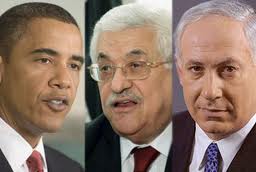 US President Barack Obama will urge his Palestinian counterpart Mahmoud Abbas to drop a bid for UN recognition of statehood later on Wednesday.
US President Barack Obama will urge his Palestinian counterpart Mahmoud Abbas to drop a bid for UN recognition of statehood later on Wednesday.
Mr Obama will also meet Israeli PM Benjamin Netanyahu amid frantic diplomacy aimed at averting a crisis.
The US president has vowed to veto the bid, backing Israel’s view that direct talks offer the only route to peace.
But efforts by US, European, Russian and UN mediators have yet to produce guidelines for the resumption of talks.
The last round of talks broke down a year ago.
Mr Abbas is set to launch the statehood bid on Friday, after his address to the United Nations General Assembly, with a written request to Secretary General Ban Ki-moon.
But Mr Obama will ask him not to push for a vote in the Security Council, where the US has promised a veto, to give the “quartet” of mediators time to produce a statement that would be the basis for resumed peace negotiations.
“With both the Israelis and the Palestinians, the president will be able to say very directly why we believe action at the United Nations is not the way … to achieve a (Palestinian) state,” deputy national security adviser Ben Rhodes told reporters.
‘Two states’
The quartet aims to give the two sides a year to reach a framework agreement, based on Mr Obama’s vision of borders fashioned from Israel’s pre-1967 boundary, with agreed land swaps.
The statement would also endorse the idea of “two states for two peoples, Jewish and Palestinian”, according to the AP news agency.
However, UK Foreign Secretary William Hague acknowledged there had as yet been no progress.
And Mr Obama’s stance has come under fire from Republican opponents.
Texas Governor Rick Perry said: “The Obama policy of moral equivalency, which gives equal standing to the grievances of Israelis and Palestinians, including the orchestrators of terrorism, is a dangerous insult.”
Both Mr Netanyahu and Mr Abbas have said they are prepared to engage in direct talks. But Mr Abbas has so far appeared determined to press ahead with the statehood bid.
If his request is approved by Mr Ban, the Security Council would then examine and vote on it. In order to pass, the request must get the votes of nine out of 15 council members, with no vetoes from the permanent members. The US has said it will use its veto.
‘Self-determination’
Palestinian Foreign Minister Riyad al-Malki said he thought the bid could win the backing of nine council members.
“We hope the United States will revise its position and be on the side of the majority of nations or countries who want to support the Palestinian right to have self determination and independence,” Reuters news agency reported him as saying.
However, before leaving for New York, Mr Netanyahu told members of his Likud party the path to peace was “through dialogue and not through unilateral declarations”, AFP news reported.
Should the Palestinian bid fail, Mr Abbas could ask for a vote of the General Assembly for enhanced observer status, which is enjoyed by others such as the Vatican, in which case no veto would be possible.
While UN recognition would have largely symbolic value, the Palestinians argue that it would strengthen their hands in peace talks with Israel, especially on the final issues that divide them.
These are the precise location of the border, the status of Jerusalem, the right of return of Palestinian refugees, water, and security.
BBC

Leave a Reply
You must be logged in to post a comment.